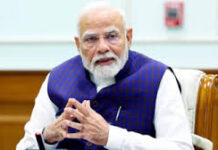Roorkee: Pregnant women can access real-time medical support and advice on an interactive smartphone App ‘SwasthGarbh’ developed by researchers at Indian Institute of Technology Roorkee (IIT-Roorkee) in collaboration with the All India Institute of Medical Sciences (AIIMS), New Delhi.
It assists pregnant women by ensuring timely antenatal care visits, recording every clinical test and improving medication adherence.
It enables two-way communication between patient and doctor for real-time medical assistance, according to a statement issued by the IIT-Roorkee, drawing comparison with the Apps which provide only pregnancy-related information and lack the involvement of clinicians.
Hence, to cater to this requirement, Sahil Sharma and Prof. Deepak Sharma from the Department of Biosciences and Bioengineering, IIT Roorkee, along with Prof. Vatsla Dadhwal and Prof. Aparna Sharma from AIIMS, Delhi, developed ‘SwasthGarbh,’ an interactive platform to promote prenatal care which is holistic in its outlook and patient-centered.
Both patients and doctors can avail of the benefits of the ‘SwasthGarbh’ App free of cost as it is available on Google Play Store, the statement said.
This is the first pregnancy App that provides instantaneous access to doctor’s advice and is clinically endorsed as well as credible, the statement said.
This can be a vital tool for women in rural areas and those who do not have easy access to doctors, it said.
The clinical assessment of 150 patients demonstrated the utility of the App in improving the quality of antenatal care and reducing complications, the statement said.
It said the patients registered on the App showed a significantly higher number of mean antenatal visits and better compliance with the WHO guidelines.
It also helps in better counselling of patients regarding the formulation of birth plans and the management of physiological problems encountered in pregnancy, the statement said.
The App has been designed:
— for assisting pregnant women with hospital visits, in terms of when they are due and what tests are required
— to keep a record of clinical tests and symptoms
— for sending automatic notifications to the doctor and patient in case any parameter cross the normal range or any danger sign is present
— for posting customized notifications to an individual, a group, or all patients
— for apprising the women of precautionary advice during any pandemic using easily understandable videos
— to support several international languages.
The benefits of the App increase further during pandemic situations when patients are afraid to visit hospitals due to the risk of catching coronavirus infection, or are unable to do so due to country-wide lockdowns or movement restrictions, the statement noted.
In future, we will use machine learning to predict the possibility of occurrence of any abnormality/disease so that timely intervention can be given, it said.
Elaborating on the research, Prof. Deepak Sharma said, “As higher Neonatal Mortality Rate is an alarming concern, SwasthGarbh Mobile App will provide real-time medical support to all pregnant women and improve maternal-fetal health.”
Highlighting the utility of the App, Prof. Rama Chaudhry, Dean (Research), AIIMS New Delhi, said, “SwasthGarbh App will be quite useful for providing potential solutions to common problems in pregnancy. Our goal is to make the SwasthGarbh App reach every household of our country and thus save precious maternal-fetal lives.”
Prof. Vatsala Dadhwal, Department of Obstetrics and Gynaecology, AIIMS New Delhi, said, “SwasthGarbh App allows two-way communication between the patients and doctors to improve pregnancy outcomes. Our pilot study showed that the App was well accepted by the pregnant women as well as doctors. We would like that more and more patients and doctors use the App so that the quality of healthcare provided may be enhanced.”
Congratulating the researchers, IIT Roorkee Director Prof. KK Pant said, “The utility of telemedicine in healthcare has been brought to the forefront by the COVID-19 pandemic. The smartphone, with over one billion users worldwide, has tremendous potential to transform the field of medical sciences and improve healthcare.”







